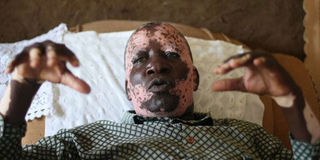Violence victims still searching for justice

Benard Orinda Ndege at his home in Kobala, Homa Bay County. Ndege is happy that the ICC cases are done with and Kenyans should now focus on harmony and forgiveness. He asked President Uhuru Kenyatta, William Ruto and Joshua Sang to help victims also celebrate in their victory on April 16, 2016. PHOTO | TOM OTIENO | NATION MEDIA GROUP
What you need to know:
- While the ICC has vacated the second case, citing insufficient evidence, the end of international legal proceedings does not take away from the fact that the post-election violence happened, that many people continue to suffer.
- On Wednesday, survivors and supporters gathered outside the Milimani Law Courts in Nairobi, where a statement was read out to journalists.
- President Kenyatta pledged to establish a Sh10 billion restorative justice fund to provide a “measure of relief” and “underscore my government’s goodwill” to the victims of past injustice while the TJRC report was processed.
On Saturday, President Uhuru Kenyatta and Deputy President William Ruto are scheduled to attend a “thanksgiving service” at Afraha Stadium in Nakuru to celebrate the termination of their cases at the International Criminal Court (ICC).
However — while President Kenyatta has spoken of this development as something that “brings to a close what has been a nightmare for my nation” — for many the nightmare continues.
In short, while the ICC has vacated the second case, citing insufficient evidence, the end of international legal proceedings does not take away from the fact that the post-election violence happened, that many people continue to suffer, and that many continue their search for some degree of justice. At the same time, many continue to fear a repetition of election-related violence at either the next or future elections.
This ongoing struggle for justice was evident this week in a constitutional petition brought by eight survivors of sexual and gender-based post-election violence who were gang-raped or forcibly circumcised.
The case is currently before the High Court and, on Wednesday, survivors and supporters gathered outside the Milimani Law Courts in Nairobi, where a statement was read out to journalists.
The statement emphasised how, “the case does not to seek to send anybody to jail”, but instead “seeks to have the court establish that important government offices and their holders failed to prevent the violence, protect the survivors from sexual violence, investigate and prosecute perpetrators, and provide effective remedies to victims”.
BEGIN CREDIBLE INVESTIGATIONS
More specifically, the statement noted how, “survivors want the truth about what happened to them known; and they want the State to acknowledge that they suffered, begin credible investigations and prosecutions, provide reparations, including medical and psychological treatment, legal and social services, and compensation, and reform the responsible institutions and change the relevant policies so that no one else undergoes the suffering we have endured ever again”.
Significantly, many of these requests — including a state apology, the provision of reparations, and reform of key institutions — were also recommended by the country’s Truth, Justice and Reconciliation Commission (TJRC), which handed in a final report in May 2013.
Unfortunately, the TJRC’s findings are yet to be widely disseminated, while Parliament is yet to even discuss the report. In the meantime, the Jubilee government has periodically raised the issue of reparations. In his annual State of the Nation address in Parliament in March 2015, President Kenyatta pledged to establish a Sh10 billion restorative justice fund to provide a “measure of relief” and “underscore my government’s goodwill” to the victims of past injustice while the TJRC report was processed.
However, one year later, little progress has been made in the establishment of such a fund, while the President’s State of the Nation address in March this year was silent on the issue. In turn, for many victims, the President’s earlier pledge, “In the absence of laws, policies and institutional structures … seems like mere lip service”.
Thus, while the Jubilee alliance celebrates the end of one particular nightmare – namely the charges of crimes against humanity that had been brought against President Kenyatta, DP Ruto and former radio presenter Joshua Sang for their alleged role in the post-election violence – many others who were affected by those months of unprecedented violence can only dream of the day that their nightmare will end.
Gabrielle Lynch is an Associate Professor of Comparative Politics, University of Warwick, UK ([email protected]; @GabrielleLynch6)





